Winter Wonderland. Yes, I know it was tough on the Crosstown, and 494 was a mess, and I-35 south of town was no treat, let me tell 'ya! When we talk about winter storms we use discriminatory words like "warning" and "threat" and "risk" - realizing the impact heavy snow has on our commutes and travel plans. And yet, every now and then I get a reminder of how spectacularly beautiful the snow is here in Minnesota. I love the first few hours after a snow - when it's still globbed onto the tree branches, when everything is coated in a magical blanket of white, like my entire neighborhood just got spray-painted by some crazy guy with a big firehose full of pure, white magic - a substance so rare (and amazing) that it can pull families together - snowball fight, building a snowman, heading off to the nearest ski hill together. I know we are guilty of erring on the side of treating snow as a "bad thing", driving is always top of mind. But for a guy with a couple of Polaris sleds, fresh snow is anything but bad. It's a blessing from on high, an excuse to forget about my honey-do list and hit the trails. Snow brings out my inner 6 year old. A hassle? Perhaps. On some level, yes. But I hope I never lose that sense of wonder...
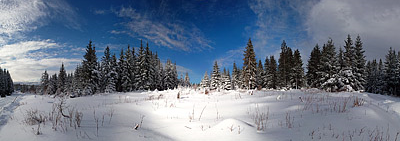
* Normal December snowfall at MSP: 10" Last December (2009) 20.9" snow fell. The all-time record? 33.2" in 1969.
Snowfall totals from the National Weather Service:
How Much Fell? When you come right down to it the region of plowable snow was fairly narrow, no more than 100-125 miles wide, with the heaviest amounts focused just south/west of the Twin Cities, where some 8-12" amounts were reported. No snow in Des Moines, Duluth or Bemidji, 5" at St. Cloud, roughly 3-4" northern suburbs (near Scandia) but close to 12" at Lakeville. Again, an 8" variation just across the Twin Cities metro area!
Record-Setting Clipper. Friday night's clipper was extraordinary, tapping moisture and energy from the Pacific, focusing all that moisture on a narrow band of significant snow. According to NOAA and Ham Weather a number of towns in Minnesota set 24 hour rain and snowfall records. Click
here for an interactive map with more details.
Evolution Of A Clipper. Here is what NWS Doppler looked like as the clipper arrived yesterday, a STREAK of light to moderate snow racing toward the east-southeast at 30 mph, narrow bands of heavier snow setting up just south/west of MSP. Look carefully and you can see a "comma-shape" to the snowy swirl, evidence of a counterclockwise-rotating area of low pressure swept up in the (125 mph) jet stream winds howling 5-6 miles overhead. Every clipper is different, which is a sobering thought. Overall though the models did a pretty good job helping us nail this storm. The southern/western suburbs DID see the heaviest amounts, close to 10" near Lakeville, 9" at Chaska, while the northern 'burbs still picked up enough to shovel and plow. More from the local Chanhassen NWS office
here.
Next "Plowable" Snow. Yes, I'm noticing the same thing you're noticing - that we seem to be sliding into a real winter. No El Nino to save us this winter - looks like we'll see colder than average temperatures through much of December, and above average snowfall for the month (normal snow at MSP is 10"). The next chance of a few inches (enough to shovel and plow) comes Thursday, another few inches Saturday afternoon/night.
Timing The Clippers. The models are in fairly good agreement: 1-2" from Thursday's clipper, maybe another 2-3" Saturday PM hours. Stay tuned - that forecast will almost certainly change as new data and model runs arrive.
Are We Freezing Because Of Global Warming? I know, I rolled my eyes too. talk about counterintuitive. How on Earth can you pin outbreaks of severe cold/snow on climate change? True, the weather is becoming more extreme worldwide, more record storms and floods, but could the thaw underway in the Arctic displace numbing air southward, air that should be over the Yukon, Alaska and Siberia? Climatologists are still trying to get a grip on how thinning ice and changing ocean circulations in the Arctic Region may be having a ripple effect, a domino effect across the rest of the Northern Hemisphere. From an
article in the U.K's Telegraph: "
As a blanket of snow settles across the country, train services grind to a halt and roads become impassable, you could be forgiven for thinking that global warming seems more remote than ever. But yesterday, the World Meteorological Organisation announced that 2010 is almost certain to rank among the three warmest years since records began in 1850 – and it has long been accepted that one of the effects of climate change could be an increase in the frequency of harsher, Continental-style winters. So which is it? Is it the vagaries of the elements that we should be cursing through our chattering teeth, or the carbon emissions from Chinese smokestacks?"
WeatherTalk. From Mark Seeley's excellent weekly
blog, which touches on weather, climate and interesting stories around the world, "
Soils are now frozen to variable depths depending on snow cover. Frozen soil depth appears to vary from 2 inches to as much as 8 inches. Soil freezing will continue to deepen with colder temperatures expected over the weekend. Only areas that receive significant snowfall from the winter storm over Friday and Saturday may see soil freezing stabilize as a result of the insulting effect of the added snow cover. Elsewhere if snow cover is thin, soil freezing depth will continue to plummet with very cold temperatures over the weekend and into next week."
The Future Of TV: "Snapping, Swiping And Surfing". If you're in an introspective mood you might want to click over to this
story from Reuters, focusing on how we'll be using our TV sets in the years ahead. Google TV is a start, but still something of a kluge, from everything I've read. Who wants to have a keyboard in their lap watching the boob tube? From the article: "
Fall back on your sofa in five years, snap your fingers to turn on a TV that's thin as paper and stretches across a wall, then ask it to switch to your favorite sports channel so you can watch the day's baseball game in 3-D -- no glasses required. This is a portrait painted by top executives when asked about the future of TV. Not all agreed on details -- some, like Viacom Chief Executive Philippe Dauman, warned big changes could take more than five years given that people tend to have "a very optimistic view of how quickly and widely devices will be adopted."
*
Smart TV's Expand On-Demand World. A good follow-up story from the New York Times
here.
Winter Wonderland. After a snowy start the sun came out by afternoon, highs ranging from 16 at Alexandria to 21 in St. Cloud, 25 in the Twin Cities - where 4" fell since midnight. Even though 6-7" fell at MSP International Airport, it was a light, powdery snow - settling of snow brought that total down to 4" by evening.
Paul's Conservation MN Outlook for the Twin Cities and all of Minnesota:
TODAY: Coldest day since Feb. 1. Sunny. Winds: NW 10. High: 14
SUNDAY NIGHT: Mostly clear and "cold enough for me." Low: -3
MONDAY: Blue sky, fresh Yukon breeze. High: 13
TUESDAY: Plenty of sun, still numbing. High: 19
WEDNESDAY: Sunny start, clouds increase. High: 21
THURSDAY: Next clipper, quick shot of snow. High: 28
FRIDAY: Few flakes, better travel - mostly cloudy. High: 21
SATURDAY: Dry start, PM snow, few inches? High: 22
In Praise of Snow
"
Oh! the snow, the beautiful snow, filling the sky and earth below, over the housetops, over the street, over the heads of the people you meet. Dancing, flirting, skimming along" wrote poet Thomas Jackson.
Two words: mea culpa. Meteorologists give snow a bad name. We talk about a RISK of snow, a THREAT of a storm. Travel headaches on the Crosstown trump the sheer wonder of a fresh snow; it's democratic and miraculous, bringing families and friends together. Commuters groan but snow enthusiasts can't believe their good luck: 4-10" of perfect, Aspen-like powder. Support local ski resorts, hit the trails - at this rate we may surpass last December's 20.9", but the all-time December snow record of 33.2" in '69 is probably not in danger.
The sun shines today, resembling a street lamp , it's so low in the sky (and incapable of warming us up). The winter solstice is little more than 2 weeks away, long nights brewing up a fresh batch of Yukon Delight into midweek.
More clippers squeeze out snow Thursday, again Saturday; a very active pattern indeed. Finally, 6" fell on the downtowns, but Paul's coveted (?) "Golden Snow Shovel Award" goes to Lakeville: 11.7" of fluff. Wow!
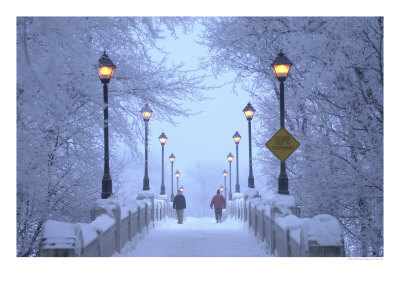 Canada Having Its Warmest Year.
Canada Having Its Warmest Year. According to the WMO (World Meteorological Organization) Canada is experiencing its warmest year on record, national temperatures running close to 7-8 F. above long-term averages. More details from Canada's Chronicle Herald newspaper
here.
Climate Change Could Cost 1 Million Lives A Year By 2030. From an
article at redorbit.com: "
Estimates brought to the table at UN talks on Friday state that climate change will indirectly cause nearly one million deaths annually by 2030, and will inflict 157 billion dollars in damage, with most of the misery being piled onto more than 50 of the world’s poorest countries. Although most countries around the world will feel the devastating effects of climate change, none will pay as high an economic bill as the United States, the estimates suggest. “In less than 20 years, almost all countries in the world will realize high vulnerability to climate impact as the planet heats up,” the report warned.
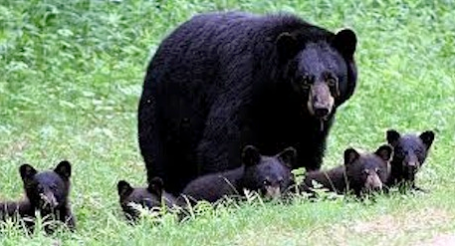 Signs That Show Man-Made Global Warming is Definitely Still Happening
Signs That Show Man-Made Global Warming is Definitely Still Happening. From the U.K's Telegraph: "
As your boiler breaks down, your pipes freeze, your car won’t start, your Ocado delivery fails to arrive, your train is cancelled, your neck is broken after slipping on black ice and you lie in an emergency ward waiting for a doctor to turn up only to learn that they’re all off today because of the weather, you might be forgiven for thinking that all this has something to do with global cooling, changes in the Pacific Decadal Oscillation, and the decline in sunspot activity perhaps auguring a new Maunder minimum.
But you couldn’t be more wrong.
“It’s all actually a sign that man made global warming is very much a live issue and that there’s more of it happening than ever,” says a top scientist, who holds the British record for securing grant-funding for global warming research projects so he must know what he’s talking about.
“Look at the Met office,” the scientist goes on. “They’ve just told us that 2010 is the hottest year since records began in 1850 and even though the stupid Central England Temperature record tells us something quite different and even though the year hasn’t actually finished yet they must know what they’re talking about and they definitely can’t have fiddled the data because the Met office is part of the government and they wouldn’t lie or get things wrong which is why that barbecue summer was such a scorcher.” The big problem is, the scientist said, is that the public are really stupid. They think just because Dr David Viner of the Climatic Research Unit said in the Independent in 2000 that soon there’d be no snow because of global warming, when what he actually meant was that soon there’d be lots of snow and that this would be “proof” of global warming. The interviewer just missed out the word “proof” that’s all because journalists are lazy that way." The complete story is
here.
Americans Fail The Climate Quiz. An excerpt from Ira Flatow who moderates
Science Friday at NPR: "
The heated discussions over global warming are about to be turned up a notch as the new Congress takes over next month, composed of many more global warming skeptics or non-believers. Many on Capitol Hill like to say they are merely a reflection of their constituents. Is that true? How much do you know about climate change? Here's a pop quiz, questions from a recent survey by the Yale Project on Climate Change Communications to find out how much Americans know about climate change. We're going to - just three questions from that quiz. Here we go. Question number one. True or false: The Earth's climate is warmer now than it's ever been. Is it warmer now than it's ever been? The majority of the 2,000 people surveyed said true, but that's false. Number two. True or false: Banning aerosol spray cans worldwide will help reduce global warming. Most people thought so, but the answer is no. (Unintelligible) Number three. What's contributed more to rising sea levels so far? Is it A) melting sea ice in the Arctic Ocean; or B) warmer ocean temperatures. Sea ice, melting sea ice, or warmer ocean temperatures. Most people said it was melting sea ice, but the answer is warmer ocean temperatures."
World's Appetite Outpaces Crop Harvests. The climate is evolving at the same time population trends are accelerating. Will we be able to feed the world's rapidly growing population, in a time when floods and droughts are on the increase worldwide? Here is an excerpt from an
article in the New Zealand Herald: "
Feeding the world, 9 billion people by 2050, will mean boosting food output globally by 70 percent over 40 years, the FAO says. But wheat, the biggest source of protein in poorer countries, is falling behind: As global population grows 1.5 percent a year, the growth in wheat yields, the amount of grain produced per hectare, has slipped below 1 percent a year. In the United States, yields generally peaked in the 1990s. In the face of leapfrogging prices, stagnating yields and shifting climate zones, wheat cannot be counted on to fill mankind's stomach in the future as it has since at least 7000 B.C. Affordable substitutes are often unavailable in places like India and Egypt. "Humanity faces tremendous challenges to food security," the world's top wheat researchers conclude in a blueprint for a stepped-up strategy to produce more of the grain."

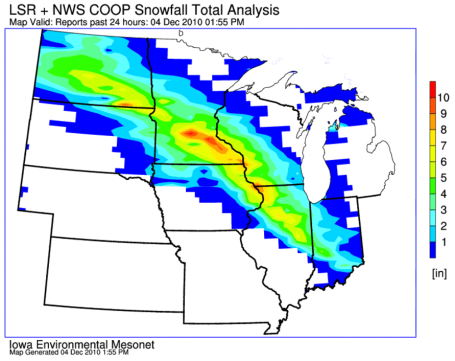
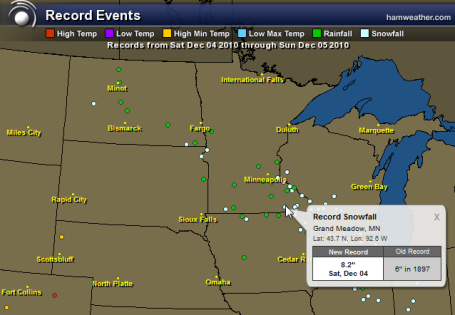
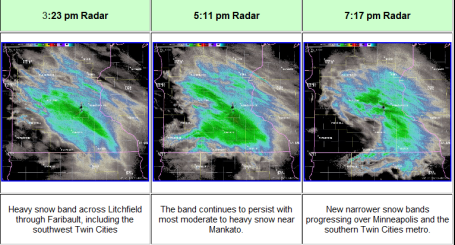
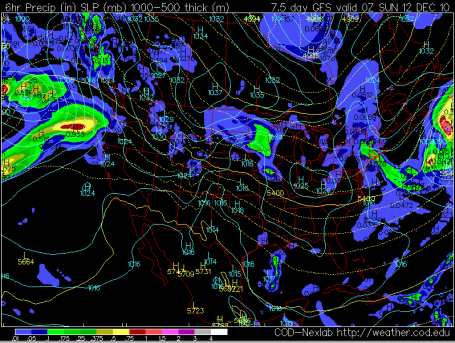
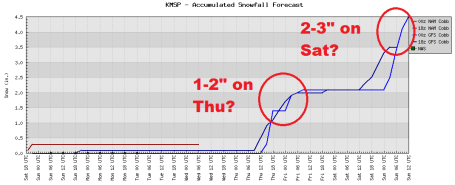
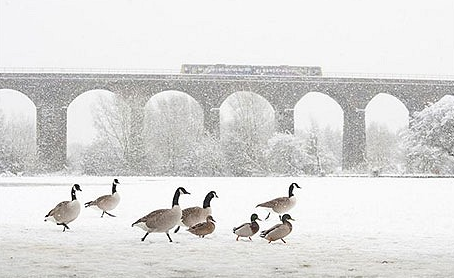

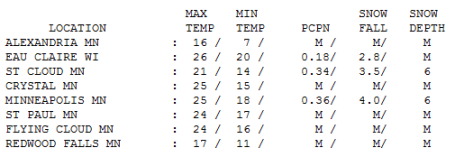
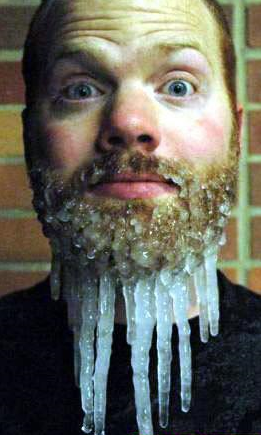
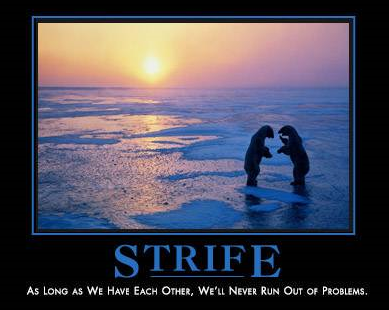

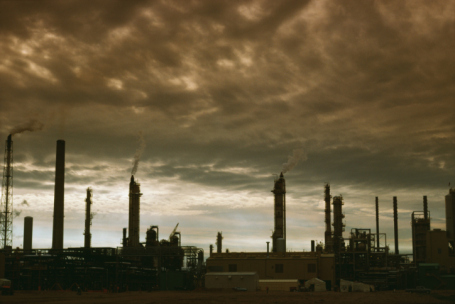



No comments:
Post a Comment